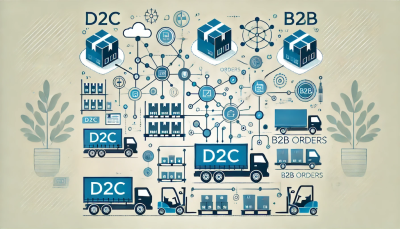What are they?
Let’s start this off by defining what a lot number is and why you should care about it.
But before we define lot numbers, we need to define lot tracking.
Lot tracking is the process or system used to track product lots or batches along the entire supply chain from the manufacturer to the supplier, distributor, retail store, and finally, to the end customer.
In some cases, the same business will handle multiple steps in the supply chain. In others, they might not handle any of the steps directly but they need insight into each step through systems and reports.
A lot number is a unique string of numbers that identifies a group of finished products, materials, or supplies. It’s usually assigned by the manufacturer of those products. It’s the ability to track all of the materials used for a finished product across the entire supply chain.
Here’s an example from a bottle of hand sanitizer sitting on my desk as I type this:
A lot number might also be called a lot code, code number, or batch number.
SKUs vs. Lot Numbers
These are often confused so let’s clear them up real quick.
Lot numbers refer to a specific quantity of a product.
SKUs refer to the specific product itself.
Each product only has one SKU number but whenever you make that product in bulk, all of those items in that batch will also share the same lot number.
The next time you make that product in bulk, that batch will share a different lot number than the first batch.
Why do they matter?
Here are some high-level reasons you need batch records:
- Big-box stores require them if you want to be on their shelves
- You sell perishable goods, potentially harmful products, regulated items, or products with dye lots.
- Might be required to receive FDA, ISO, or CFIA compliance for your business
- Helps you quickly handle product recalls
Scenarios where you need them
Lot tracking isn’t required from day one but it’s a best practice that you would be wise to implement as soon as possible!
Even if you’re just selling food products at a farmer’s market, lot numbers will help you identify problems that come up. Let’s say, for instance, that a customer buys your product, takes it home, and has a bad experience with it.
Maybe it caused an allergic reaction, tasted funny, grew mold, or any myriad of reasons. That customer then contacts you through an email address, website form, or even a social media post (whatever they can get from your label!), you apologize, fix the situation, and then promptly refund their money. But how do you know exactly what went wrong?
Do you have more products from that batch in your inventory? Have other people complained about products from that same batch? Were their complaints similar?
Let’s take it one step further and say you sold that batch to a retail store and the same situation occurred. To avoid further problems, you would want to contact that store immediately and request that any remaining products with that batch number be removed from the shelf.
Not all small retailers will require you to have lot tracking in place. So you might be able to get away with not having them at first.
But if you ever want to sell in big-box stores, they will absolutely require it. Their reputation, customer safety, and employee wellness are all on the line!
Same with shipping your products to customers. Let’s say you produced a batch of 100 bars and all of them were shipped to different customers in different cities, states, or countries. When one of those customers contacts you about a problem, you’ll want to decide if it’s worth recalling the products from all of the customers you shipped and sold to!
Lot numbers will help you with all of those scenarios.
Are you starting to see how this can be an expensive and also impossible problem to fix if you don’t have an effective lot tracking system in place?
Best Practices
Alright, so you’re sold on the importance of lot numbers and ready to implement them in your business. What now?
I’ll start by stating something that might be obvious, if your product is manufactured by a co-manufacturer or co-packer, they will likely assign and track the lot numbers for you.
If that’s the case, make sure you know how to easily get that information when you need it.
However, if you manufacture your own products, then you’re responsible for lot numbers!
Implementing lot tracking requires your company to be disciplined, consistent, and accurate with every step of your raw materials sourcing, receiving, storage, production, and inventory tracking finished goods.
Here are the basics to keep in mind:
- Every lot you produce needs a unique number
- For perishable products, also assign an expiration date
- The numbers should be stored in a secure, cloud-based system
- The system must be diligently followed and implemented for every lot. No exceptions.
When you’re first starting out and only have 1-3 SKUs, you can probably track them easily enough on your own using spreadsheets.
There’s only one problem with that, spreadsheets can easily break. And did you know that on average, 88% of spreadsheets have inaccuracies? Do you really want to put the success of your business and the health of your customers in the hands of a spreadsheet?
That’s where Fiddle comes into play, our modern inventory management software makes lot tracking a total breeze. Schedule a demo with us to learn how.









